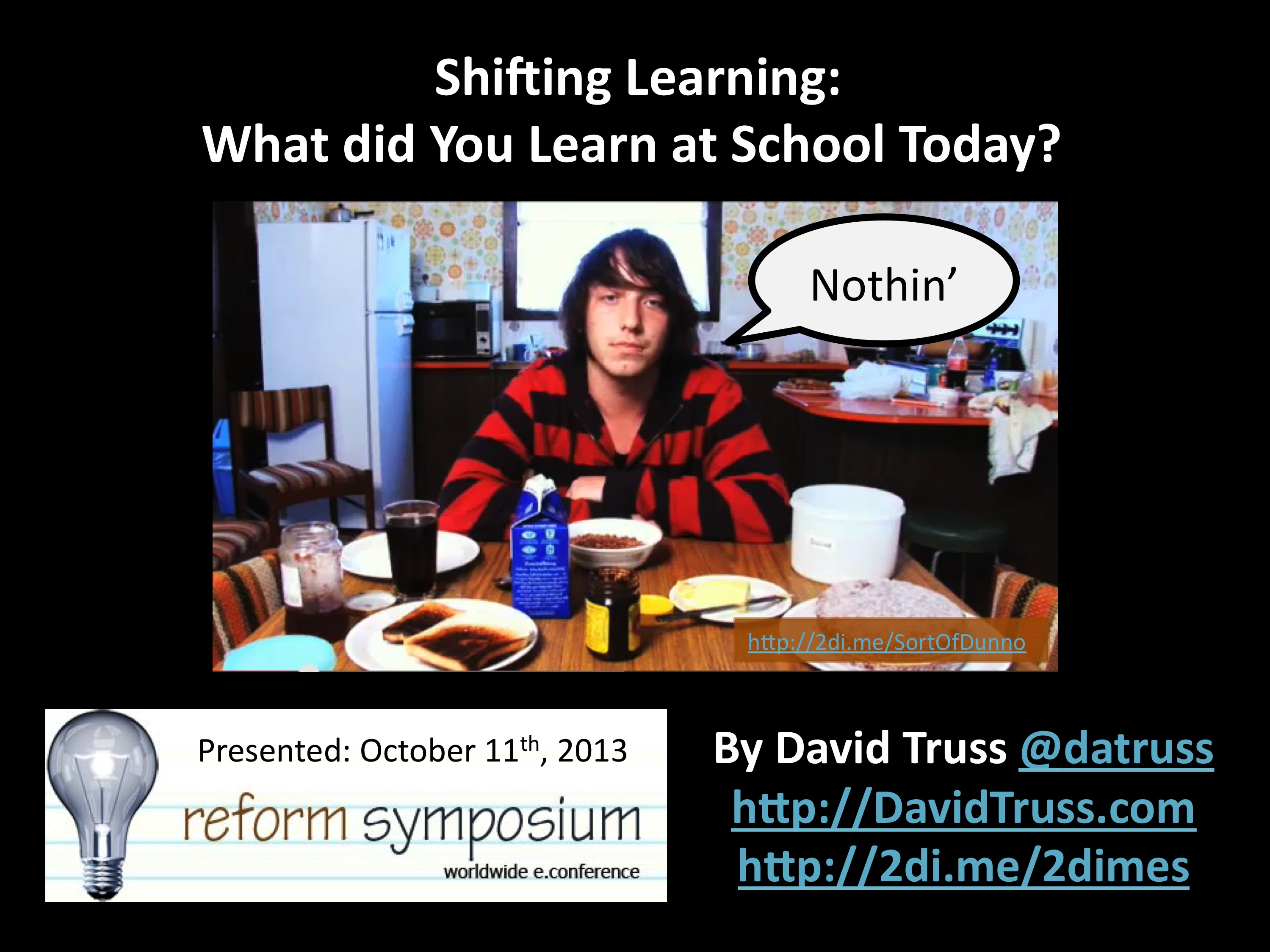Shifting Learning – What Did You Learn At School Today?
We hear a lot these days about project based learning, inquiry based learning, etc… What does that mean? What does it look like when schools shift away from “drill and kill” learning towards big ideas, questions, and “no right answer” kind of learning? And what kind of questions can ‘we’ ask to support students in their learning?
That was the presentation description that I shared for the 2013 Reform Symposium Conference. Below, I’ll share an edited video and my SlideShare deck. You can also see/hear the full presentation on the RSCON4 recording page: Room 126 – David Truss.
(On SlideShare: Shifting learning – #RSCON4 Presentation from David Truss)
I have been a fan of the Reform Symposium Conference for a while and it is an honour to be invited to present. I had an opportunity to Keynote a couple years ago, but my summer travel plans prevented this from happening. This year, there were over 100 presentations worldwide.
Here are 3 that I’ve watched already and are definitely worth mentioning:
1. Becoming a ‘connected’ educator:
Educators as Social Networked Learners – Learn how to leverage social media and networks to engage in personalized, relevant, just-in-time professional development. By Jackie Gerstein, Ed.D. Blog post: Educator as a Social Networked Learner: Presentation Materials
I designed and teach a course entitled, The Social Networked Learner, for the Boise State University’s EdTech Program. The course description reads:
This course explores collaborative and emergent pedagogies, tools, and theory related to the use of social networks in learning environments. Participants gain hands-on experience with a variety social networking tools, create their own personal learning networks, and have an opportunity to develop a social-networke
The ideas, content, and exercises presented in this course are driven by two basic tenets:
• We are living, learning, and educating in an information-ric
• This culture is seeing growth, development, and evolution of information and technology as never seen before in the history of humankind. As such, educators need to become learners along with being teachers. Educators, in this age of teaching and learning, have a responsibility to connect with, learn from and with, and share resources and information with their students and other educators both locally and globally.
This session will provide an overview of the course assignments along with the artifacts produced by the course students…
2. Being an innovative educational leader:
Educational Leadership: Creating the Conditions for Passion and Innovation – Chris will discuss how he and other administrators are creating the conditions for teachers/staff to have the time and resources to learn, explore, and connect within the school day to encourage passion and innovation. By Chris Wejr. Blog post: Creating Time for Teachers to Tinker With Ideas #RSCON4
People are often critical of schools and teachers for the lack of innovation and ability to keep up with new ideas and practices. Unfortunately, the system in which we work provides very little to encourage innovation with almost zero time and resources available for teachers and staff to be curious, play, collaborate, connect and learn. Therefore, if we want teachers to be innovative, this often has to occur on their own time. Chris will share a few ideas on how some schools are providing more time and resources to staff so they can work together to innovate and explore their passions.
3. More on inquiry learning:
Connections Through Inquiry – Exploring inquiry through the lens of teacher/learner as a trans-disciplin
This session will explore inquiry through the lens of teacher/learner as a trans-disciplin
– – – – –
As I said, there are over 100 presentations to view and I will be going through quite a few of them over the next few months. I’m sure you can find a topic of interest to view, and perhaps share.
Please let me know if you see any the you think I’d be interested in. And as always, your feedback on my post, and/or my presentation, is appreciated.

Hello Mr.Truss, My name is Jacquelyne Mckiernan I am a student at the University of South Alabama studying to become an elementary teacher. I am currently taking a class called EDM 310 where we learn how to incorporate technology and project based learning into our every day classroom. Your post was very interesting. I had never hear of the Reform Symposium Conference. After reading your post I am looking forward to looking into the RSCON and watching more presentations for myself. I really enjoyed your presentation, and that must have been a huge honor to be asked to present. Thank you for posting and I look forward to reading more of your posts.
Hi Jacquelyne,
Thank you for taking the time to comment. It is indeed an honour to be able to present for a conference like RSCON. It is also an honour every time someone new takes the time to comment on my blog. I hope that you find things that you read here useful, and I am always open to feedback.
Here is a useful link that you might enjoy: https://www.diigo.com/user/datruss/studentteacher
It has way too many links within it to read them all, but I think that I’ve shared enough information in my bookmark description to help you hone in on a few resources you might find useful.
Good luck in your studies, this is an exciting time to become an educator!
~Dave